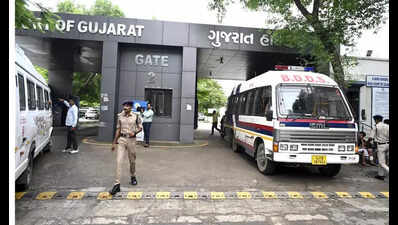Hoax bomb threat hits Gujarat courts, Vadodara school

Ahmedabad/Rajkot/Vadodara: A day after a woman from Tamil Nadu was arrested for allegedly sending over 21 hoax bomb threat emails across India, including one targeting Narendra Modi Stadium, a similar email was sent to the Gujarat high court as well as the district and sessions court near Ghanteshwar in Rajkot on Tuesday morning.
Meanwhile, panic also spread among students, parents and school authorities after Refinery English Medium School in Vadodara's Jawaharnagar area received an email threatening a bomb blast on Tuesday. On Monday, Navrachana Higher Secondary School (NHSS) in Sama had received a similar email. The threat to the courts came from an email carrying the woman's name, which confused authorities as she remains in police custody.
The threat email was received by the registrar general of the high court around 7.55am on Tuesday. It claimed that three RDX-based IEDs had been planted on the court premises, and demanded evacuation by 1.40pm, stating, "One VIP is our prize". The message was sent from the ID [email protected], the same name associated with the woman already arrested in the nationwide hoax email case. A police officer said, "Security forces, including multiple bomb detection and dog squads, rushed to the high court.
Sola police and cybercrime officials began investigations. The detained woman is not believed to have scheduled the new mail, but the message format, style, and language matched earlier hoaxes from Tamil Nadu, raising suspicions of another person linked to her being involved." Another police officer stated that the woman had sent the earlier threat emails due to personal issues. Although the current email mimics her earlier messages, initial findings suggest someone may have deliberately used her nameMeanwhile, Rajkot DCP (crime) Parthrajsinh Gohil said that a threatening message was sent to the official email ID of the district and sessions court at 8.15am.
It further stated that the bomb had been implanted in a manner that made it untraceable and would be detonated by 1.40pm on Tuesday. As soon as the alert was raised, teams from the crime branch, special operations group (SOG), Cybercrime unit, dog squad, and University police reached the court and combed the premises for close to four hours.
Entry to the premises was restricted, and visitors, including lawyers and litigants, were subjected to intense security checks.
No suspicious item was found in the operation supervised by Gohil. Ahmedabad and Rajkot police are tracing the email's origin and sender and are probing possible connections through dark web communities and shared groups.About the Vadodara hoax, deputy commissioner of police (DCP) Julie Kothiya said, "Nearly 375 students and around 35 staff members were present when the email was received. They were quickly evacuated before an intensive search by multiple agencies was carried out.
No suspicious objects were found," Kothiya added. Box:Mail mentions RDX, VIP target and political namesTimes News NetworkAhmedabad: The threatening email received by the Gujarat high court on Tuesday was sent using the name of Rene Joshilda, the Tamil Nadu woman arrested on Monday for sending hoax bomb threats. It mentioned explosives like RDX and said that a VIP will be targeted.The subject line read "Pakistan ISI-Udhayanidhi Zindabad, 3 RDX-based IEDs in Gujarat Court Premises, 1 VIP is Our Prize."
It claimed that three IEDs were placed on the premises and instructed that all bystanders be evacuated by 1.40pm.The email contained references to national agencies like NIA, ED and CBI, alleged links to scams and drug funding in Tamil Nadu and named several individuals. It included cryptic details suggesting that only one IED could be detected, while the others were equipped with silicon-based fuses.It ended with a literary clue and was signed as "Surpanagai, Rene Joshilda." Officials confirmed that the arrested woman did not send or schedule this particular email. Investigators believe someone else used her name and prior message patterns. The style matches previous threat mails sent to institutions including schools and stadiums. The Cybercrime branch is now examining whether someone close to her or part of an online group exploited her identity to send the latest threat.












